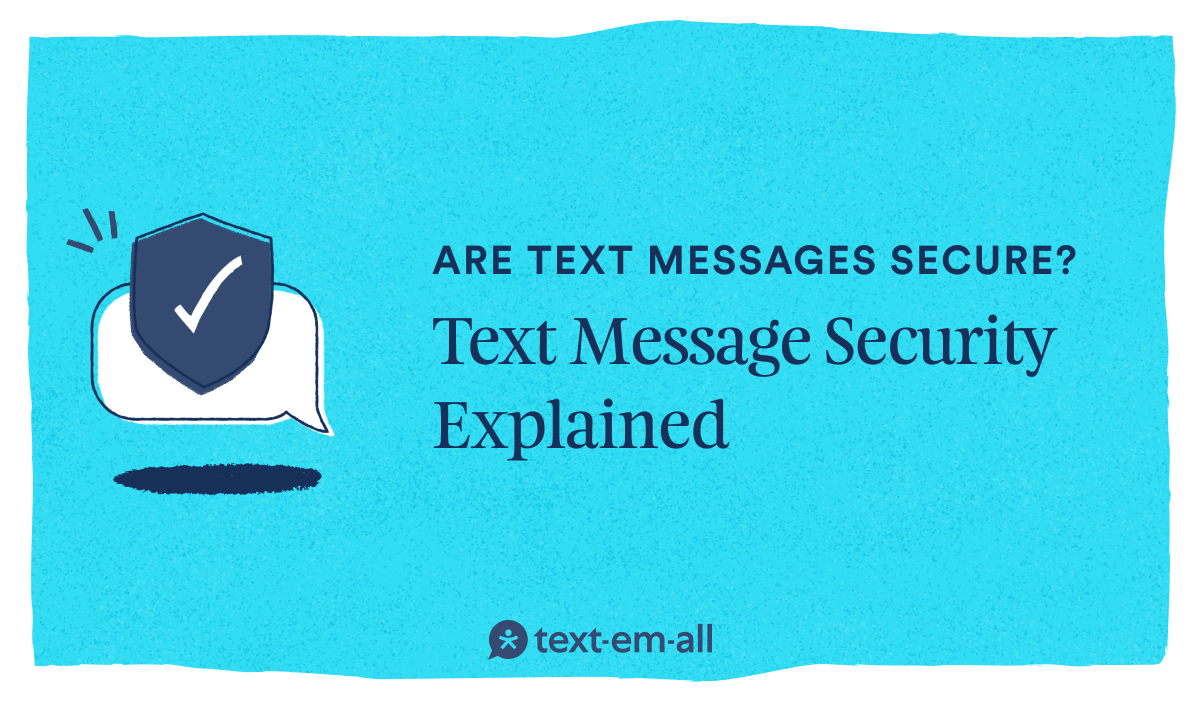
If you’re using mass texting for your business, security is likely top-of-mind. Privacy breaches and cyber threats are increasing, and understandably, so are concerns over texting safety. In this blog post, we’ll explore how text message security works, answer a few questions about text message security, and give you a few tips to secure your texts.
Understanding Text Message Security
A text message security breach can have severe consequences for businesses, including financial losses and damage to reputation or relationships with employees or customers. Industries such as healthcare and finance, which handle sensitive data, are especially susceptible to security breaches and must prioritize text message security to mitigate risks effectively.
Are Text Messages Encrypted?
Encryption is the cornerstone of security. Encryption is a method used to encode information, ensuring that only authorized parties can access and understand it.
However, traditional SMS messages lack robust encryption. This means that when you send a text message through your mobile carrier’s network, the content of the message is not scrambled or encoded in a way that prevents unauthorized access. Instead, it travels across the network in plain, readable text, making it susceptible to interception.
Why Aren’t Text Messages Encrypted?
To answer this question, we need to look at texting in a historical context.
SMS, or Short Message Service, was developed several decades ago, at a time when security concerns in digital communication were not as prevalent as they are today. As a result, encryption was not a primary consideration in designing SMS protocols, and the focus was more on achieving reliable message delivery over cellular networks.
As technology has advanced and security threats have evolved, the shortcomings of SMS encryption have become increasingly apparent. Without encryption, text messages are vulnerable to interception at various points along their journey—from the sender's device to the recipient's device, passing through multiple network nodes and infrastructure components. This lack of protection leaves text messages susceptible to interception by cybercriminals, government surveillance agencies, or even unauthorized employees within mobile carriers.
Are Text Messages Secure?
Despite texting messaging’s vulnerabilities, there are still reasons to consider text messages relatively secure. While SMS lacks end-to-end encryption, it still offers some degree of security compared to other forms of communication.
For instance, SMS messages are sent over cellular networks, which are generally considered more secure than public Wi-Fi or other internet connections. Additionally, SMS messages are typically delivered directly to the recipient's device, reducing the risk of interception compared to email or other online communication channels.
Moreover, efforts are underway to improve the security of text messaging. For example, the introduction of Rich Communication Services (RCS) aims to enhance the capabilities of traditional SMS by supporting features such as group messaging, multimedia sharing, and improved security protocols. While RCS does not provide end-to-end encryption like some messaging apps, it represents a step forward in modernizing text messaging and addressing security concerns.
However, it's essential to recognize that SMS security is not absolute, and sensitive information should only be shared via standard text messages with additional safeguards.
Enhancing Your Text Messaging Security
To bolster the security of your text message communications, consider the following tips:
Avoid Sensitive Information
Exercise caution when sharing sensitive information via text message. Opt for more secure communication channels, such as encrypted email or secure file-sharing platforms, whenever possible.
Update Your Device and Apps
Regularly update your mobile device's operating system and messaging apps to ensure you have the latest security patches and features.
Be Wary of Phishing Attempts
Be cautious when receiving text messages from unknown or unfamiliar senders, especially if they contain links or requests for personal information. If you're unsure about the authenticity of a message, err on the side of caution and avoid interacting with it.
Enable Two-Factor Authentication
Whenever available, enable two-factor authentication (2FA) for your messaging accounts. This additional layer of security prevents unauthorized access to your messages, even if your device is compromised.
Use Encrypted Messaging Apps
Instead of relying solely on traditional SMS, consider using encrypted messaging apps like Signal or WhatsApp for sensitive conversations. These apps offer end-to-end encryption, ensuring that only the sender and recipient can decrypt and read the messages.
Read The Complete TCPA Compliance Checklist for Business Messaging
Conclusion
While text message security remains a concern in today’s digital world, by taking the appropriate steps, text messaging is still a very secure way to communicate.
If you’re looking for a comprehensive solution that prioritizes security and ethical texting practices, give Text-Em-All a try. While SMS messages can’t be encrypted, our team will work tirelessly with you to ensure you have all the proper safeguards in place to protect your information. Create your free account today and give us a try.









